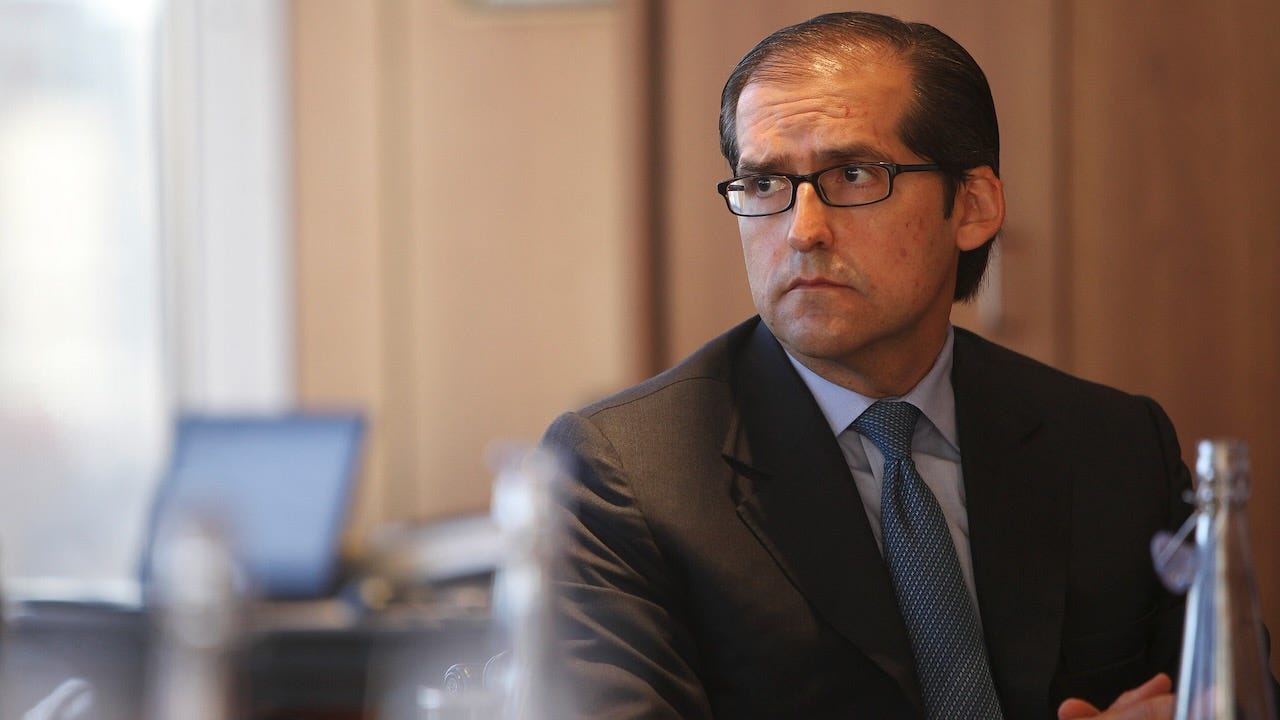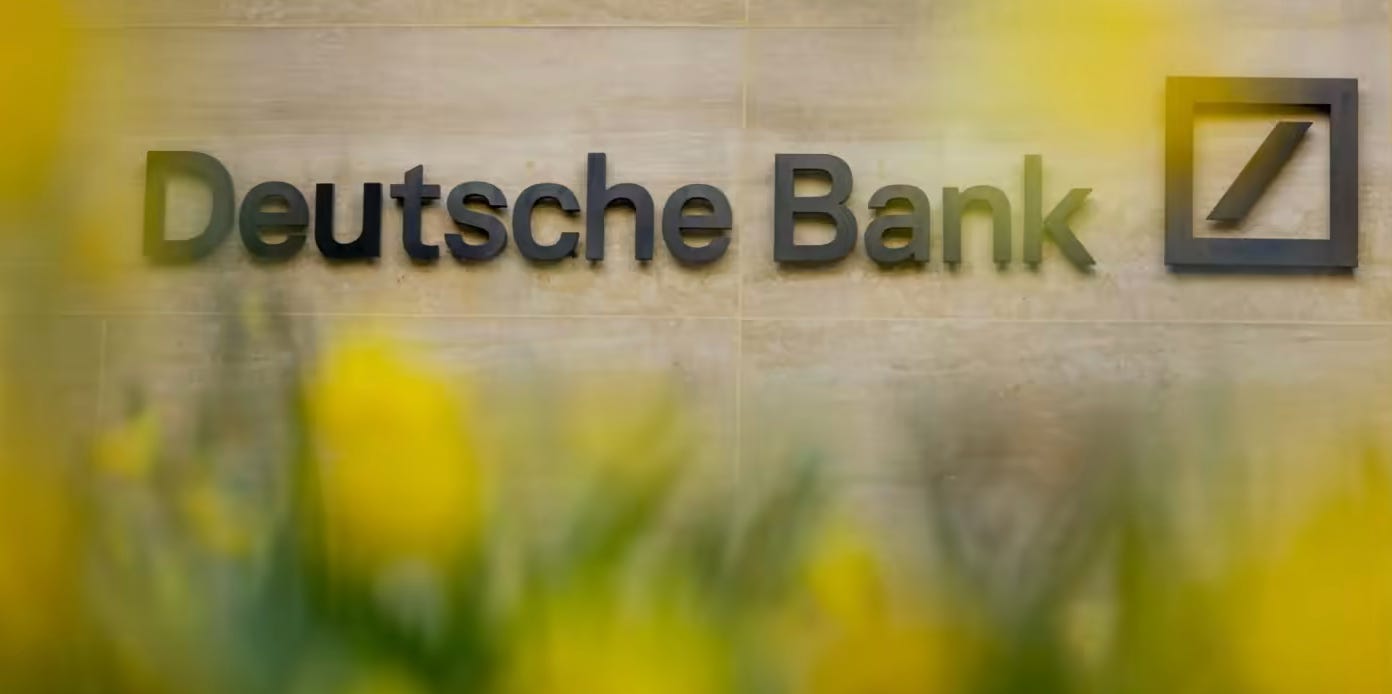Issue № 81 | London, Sunday 30 April 2023
Read on to learn why:
① Corporate communications should demonstrate humility and humanity.
② Social media programmes demand permission, content and framework.
③ A downturn is often the best time to invest and prepare for the future.
④ Blockchain will transform finance by opening up new sources of revenue.
⑤ Branding is a critical tool in attracting customers that fit your product.
⑥ The worst leaders are stressful, loud, and regularly do the wrong thing.
⑦ The best leaders are calm, discreet, and consistently do the right thing.
What's new
I chanced upon DWS (Deutsche Bank’s asset management arm) CEO Stefan Hoops’ latest LinkedIn post this week.
In short:
“It is fair to say that our Q1 was ‘OK, not great’. Nice to see significant inflows – but revenues down a bit, costs up a bit is the wrong way around and shows that we have more work ahead of us.”
“Parting ways with 15% of our senior population and substantially delayering & reorganizing the franchise was emotionally difficult but absolutely necessary. I want to thank the colleagues who have left us for the great job you did at DWS Group - we will do everything we can to make you proud alumnis.”
“We do not need heroes that swing for the fences. Alpha creation & outperformance is about the aggregation of marginal gains along the value chain…and over the length of the race. #ClientsMarketsInvesting #PlantingTheSeeds #LookingForwardToHarvest”
Why it matters
① This post is a superb piece of corporate communications. DWS’ revenues are down and it has just made a sweeping round of redundancies. Yet Hoops - while never shying away from those facts - offers explanation, recognition and an aspirational vision. He does so (using a casual style and liberal use of his own hashtags) in a way that comes across as candid, personal and genuine. He demonstrates humility and humanity. As a result, it appeals as much to clients as it does to, what I suspect was its intended audience, DWS staff.
Hoops has form in this game. He posts updates about once a week that other CEOs could learn much from. They’re written as glimpses ‘behind the scenes’ and into his thoughts, offering perspectives from client meetings, business trips, world events. Despite being a career Deutsche Banker, he manages to convey the giddy enthusiasm of a new joiner.
Having worked for Deutsche Bank myself, I find it hard to believe that Hoops’ posts are as unfiltered as they appear. I imagine they’re vetted - if not written - by the bank’s communications team and I’m sure they’re signed-off by its compliance function. But who knows? Maybe things have loosened up since I was there. Whatever their path, the important thing is that they land.
What to do about it
Take action
We’ve talked about this before, both in the context of going viral and social selling: your marketing team doesn’t need to actually ‘do’ all your social media but it should certainly be your firm’s centre of excellence on the topic, enlisting and empowering your senior leaders to help.
② Do they have what they need? It comes down to three things:
Permission: Step 1 is saying it’s okay. Your social media policy needs to be clear and enabling. I am always surprised by how many firms still have blanket bans - because it’s so much easier to say ‘no’ than to explain ‘how to’. What a waste when every single one of your employees is a potential advocate. Authenticity is essential so your employees need to feel empowered but you shouldn’t aim to coordinate too much, let alone dictate how they should share.
Content: Ensure your Marketing team has made your messages succinct and crystal clear to your own employees. They need to understand what you stand for before they’ll want to share it with their networks so internal communications is important. Marketing should then be producing high-quality content that your employees will want to share - whether because it’s creative, funny or (my favoured approach) it is genuinely valuable.
Framework: Your staff should be led by example but also with a framework of support and training for those that need it. Their level of familiarity and therefore comfort will vary enormously. Some will need guidance with the basics, others will simply want to know what to share and where to find it.
Get help
Visit InMarketing, my resource library for leaders in finance or technology who want to innovate, interact and influence.
Join the InMarketing community, either on Twitter or on Substack (you’ll need to download the Substack app and head to the chat tab). Either way, you can ask questions of me and fellow senior marketing practitioners.
Help me
If you found this useful or know someone who would, please share it. Every time you do, it helps me to grow the community of regular IMTW readers.
Top stories
The other articles that are worthy of your time.
FINANCE
Deutsche Bank signals confidence in London with £410mn Numis deal
③ A downturn is often the best time to invest and prepare for the future.
“Deutsche Bank has agreed to buy UK broker Numis for £410mn in a surprise deal as Germany’s biggest bank bets on a revival for a London market that has struggled in recent years. The bank said on Friday that it would pay 350p a share for Numis, a broker and investment bank which advises almost a fifth of companies in the FTSE 350 index on everything from equity raisings to acquisitions.”
“The purchase comes as the UK market suffers a steep decline in initial public offerings and equity raisings that are the lifeblood of firms like Numis. The group’s profits slumped more than 70 per cent last year amid a drought in IPOs and slowdown in other capital market activity. As part of the deal, Deutsche will combine and co-brand its 35-person UK and Ireland corporate finance team with Numis, which has 166 corporate clients in the UK and 332 staff, spread across trading, research and capital markets.”
“Deutsche sees it as an opportunity to push further into Europe’s largest market for investment banking fees. It also intends to expand its business by offering Numis’s clients a broader array of services, including across international markets. But Deutsche was forced to defend a transaction that appeared to reverse its retreat from equities trading. In 2019, the bank closed its equity trading business in as part of a radical overhaul that saw it slash 18,000 jobs and shrink its assets by €74bn.”
TECHNOLOGY
Franklin Templeton CEO sees blockchain as a massive disruptor
④ Blockchain will tranform finance by cutting costs and opening up new sources of revenue.

“[This week] at the Consensus event, Franklin Templeton’s CEO Jenny Johnson discussed how the asset manager is already taking advantage of blockchains. ‘Bitcoin is the greatest distraction from the greatest disruption that is coming to financial services, which is blockchain,’ she said.”
“‘If you think about blockchain, it does three things. It allows a payment mechanism. It allows a smart contract, and it allows a general ledger. So that’s going to take out the frictional costs in a transaction,’ said Johnson.”
“Zooming out, Franklin Templeton views its main value as making active investment decisions on behalf of clients. Potentially A.I. could be a threat to that. But not so much DLT. ‘Blockchain just helps us make that (investment) much more efficiently and actually opens up many more instruments in which we can invest,’ she said.”
MEDIA & MARKETING
The importance of brand personality in the modern banking world
⑤ Branding is a critical tool in attracting customers that fit your product.

“From a branding perspective, different considerations appear to be at play, with high street banks traditionally preferring descriptive product names that customers can understand, whilst neobanks appear to be more focussed upon brand identity and customer experience.”
“There is a subset of neobank known as ‘engine 2’ banks, which are neobanks established by traditional banks as a subsidiary; these are run separately to the parent, but with the financial security of the parent behind them. This provides an interesting interplay between the parent and engine 2 bank in terms of branding decisions. As a new bank, a link with the established name and reputation of the parent will be a benefit, at least initially. However, in general, neobanks aim to have a different ‘personality’ to traditional banks; they do things differently, and they want their brand to be attractive and memorable, in order to appeal to customers. ”
“These different brand identities can be used to the banks’ advantage, if the engine 2 can target a customer base for which the parent bank is not a good fit. For example, Mettle only serves small businesses that meet specific criteria, and these types of business are statistically less likely to bank with its parent, NatWest. The two operate under separate brands with unique visual identities and different ‘personalities’. Their communications and websites use different tones of voice, and for Mettle, there is a stronger emphasis on digital marketing, with focus on speed, ease and flexibility of service.”
WILDCARD
If enough people think you’re a bad boss, then you are
⑥ The worst leaders are stressful, loud, and regularly do the wrong thing.

“The question of what distinguishes someone who merely sets high standards, which is Dominic Raab’s version of events, from someone who is a bully is of interest in workplaces everywhere. In a survey published in 2021 around 30% of American workers, for example, said they had direct experience of abusive conduct at work; in two-thirds of cases, the bully was someone above them in the food chain.”
“The number and consistency of complaints about Mr Raab is itself evidence that something was genuinely amiss. Working life is not a series of discrete incidents, each bearing no relation to the other. Some of the complaints people had about Mr Raab might seem innocuous in isolation. A propensity to bang the table or interrupt people is discourteous but plenty of bosses do the same. Cutting people off in meetings would have mattered less if he was not also the sort of person to describe work he received as ‘utterly useless’ and ‘woeful’. Bullying can be a one-off, but more often it is incremental: stresses accumulate, anxiety builds, atmospheres form.”
“If enough people think you are a bad boss, you are a bad boss. If employees try to avoid you, the pool of talent available to you shrinks. Mr Tolley himself, who has done a scrupulously fair job, clearly found the deputy prime minister trying. He describes Mr Raab’s approach to the investigation as ‘somewhat absolutist’. That sounds suspiciously like British-lawyer-speak for ‘he is a complete nightmare’.”
Off cuts
The stories that almost made this week’s newsletter.
FINANCE
📈 London Stock Exchange Group posts rise in profits as data division cashes in
🕵🏻 Welcome to a new, humbler private-equity industry
🇨🇳 China’s wealth management sector reels from ‘crisis of confidence’
💂🏻♀️ Asset management CEOs — changing of the guard
🇬🇧 British bank results: Barclays profits jump 27% in first quarter and NatWest profit surge 50% on last year
TECHNOLOGY
⛓️ ‘Tokenisation is the killer app for TradFi’: JPMorgan
🍎 Can Apple really help fix banking?
🤖 JPMorgan uses ChatGPT to analyse Fed speeches
🔻 Revolut sees $15bn valuation writedown from Schroders
💶 Deutsche Börse makes €3.9bn bid for SimCorp
MEDIA & MARKETING
🙇🏻♂️ How to research your B2B audience
🪧 Memorable marketing messaging
😎 Is Bluesky the one? A Twitter alternative takes off
🇨🇭 UBS communications executive is switching sides
🎨 Microsoft Designer integrated into Edge for AI-generated social content
The last word
⑦ Jim O’Neil, who heads Bank of America’s corporate and investment banking operations in EMEA, on Win Bischoff who died this week:

“Win exemplified the best aspects of his generation of leaders: calm in a crisis, discreet, and resolutely committed to doing the right things.”
Don’t settle for marketing.
Strive for InMarketing: innovate, interact, influence.
Wishing you a productive week,
P.S. On Friday I had the opportunity to try Noble Rot’s latest outpost in Mayfair’s Shepherd Market. It’s a triumph, I recommend it to you.








